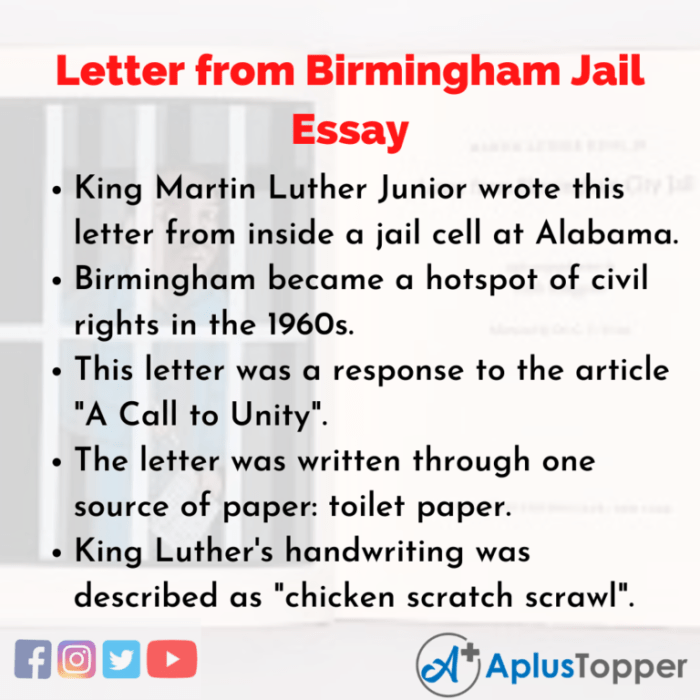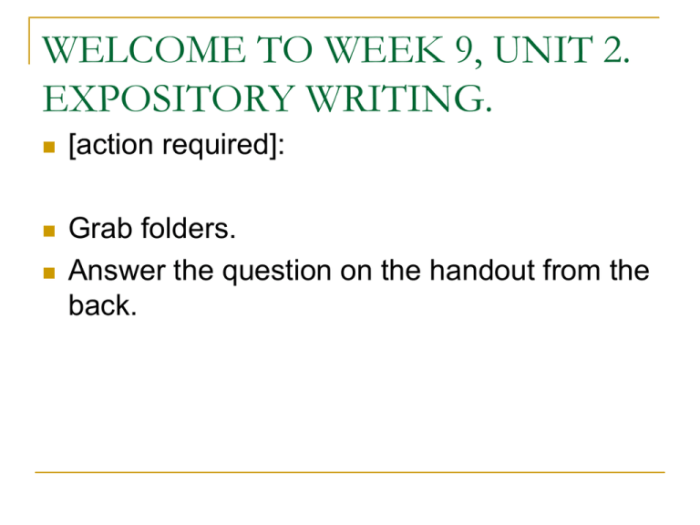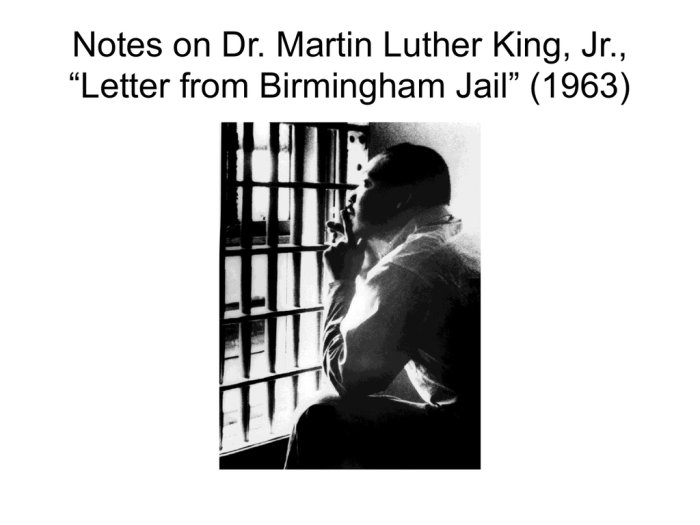Questions for letter from birmingham jail – Questions for “Letter from Birmingham Jail” delve into the profound insights of Dr. Martin Luther King Jr.’s seminal work, inviting readers to critically examine the themes of injustice, nonviolent resistance, and the urgency of action in the face of racial oppression.
This compelling analysis unpacks the historical context and main arguments presented in the letter, providing a comprehensive understanding of King’s vision for a just and equitable society.
Introduction

The “Letter from Birmingham Jail” is a pivotal document in the American civil rights movement, written by Martin Luther King Jr. in 1963 while he was imprisoned for his involvement in nonviolent protests in Birmingham, Alabama.
The letter addresses the urgent need for racial justice and Artikels King’s philosophy of nonviolent resistance. It has become a timeless call for social change and remains a powerful testament to the struggle for equality.
Injustice and Oppression

Specific Examples of Injustice
- Denial of voting rights
- Racial segregation in public facilities
- Police brutality
- Economic discrimination
King’s Use of Examples
King uses these examples to illustrate the systemic and pervasive nature of racism in Birmingham and to argue that the fight for civil rights is a matter of basic human dignity and justice.
Nonviolent Resistance
King’s Philosophy
King believed that nonviolent resistance is the most effective way to achieve social change because it:
- Appeals to the conscience of the oppressor
- Creates a sense of moral pressure
- Forces the oppressor to confront the injustice of their actions
Justification and Objections
King justifies this approach by arguing that violence only breeds more violence and that it is morally wrong to inflict suffering on others.
He addresses potential objections by asserting that nonviolent resistance is not a passive or cowardly approach, but rather a courageous and active form of resistance.
The Role of the Church
King’s Critique
King criticizes the church for its silence and inaction in the face of racial injustice.
He argues that the church has a moral obligation to speak out against oppression and to support the struggle for civil rights.
Call for Action
King calls on the church to become a “moral force” in the fight for justice and to provide spiritual guidance and support to those engaged in the struggle.
The Urgency of Action
Sense of Urgency
King conveys a sense of urgency in the letter, arguing that the time for action is now.
He warns that inaction will only lead to further violence and suffering.
Immediate Action
King argues for immediate action to address racial injustice, emphasizing that the struggle for civil rights cannot be postponed or compromised.
The Importance of Dialogue
Dialogue and Communication, Questions for letter from birmingham jail
King emphasizes the importance of dialogue and communication as a means of resolving conflict and building understanding.
He believes that open and honest conversations can help to break down barriers and foster reconciliation.
Dialogue’s Power
King argues that dialogue can create a space for empathy, compassion, and shared understanding, even between those with opposing views.
The Power of Love

Love in King’s Vision
King envisions a just society built on the foundation of love.
He believes that love has the power to overcome hatred, prejudice, and division.
Love’s Transformative Power
King argues that love can transform individuals and communities, creating a world where all people are treated with dignity and respect.
The Legacy of the Letter
Impact on Civil Rights Movement
The “Letter from Birmingham Jail” had a profound impact on the civil rights movement.
It helped to galvanize support for nonviolent resistance and inspired countless activists to join the struggle for equality.
Continued Relevance
The letter remains relevant today, providing insights into the ongoing fight for racial justice and the importance of nonviolent resistance.
It continues to inspire and motivate individuals and organizations working to create a more just and equitable society.
FAQ Guide: Questions For Letter From Birmingham Jail
What are the key themes explored in “Letter from Birmingham Jail”?
The letter addresses injustice, nonviolent resistance, the role of the church, the urgency of action, the importance of dialogue, and the power of love.
How does King justify his philosophy of nonviolent resistance?
King argues that nonviolence is morally superior to violence, fosters self-respect and dignity, and ultimately creates a more just and harmonious society.
What does King criticize about the church’s response to racial injustice?
King criticizes the church for being too slow to condemn racial injustice, for valuing order over justice, and for failing to actively participate in the struggle for civil rights.
What is the legacy of “Letter from Birmingham Jail”?
The letter has been widely recognized as a powerful and influential document that has inspired countless individuals and movements dedicated to fighting for civil rights and social justice.